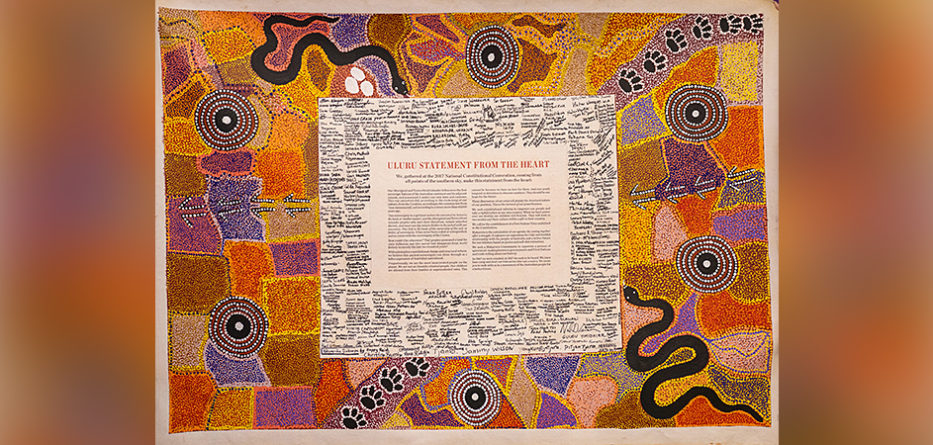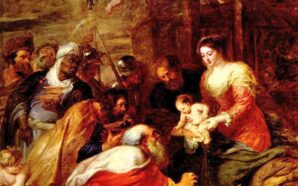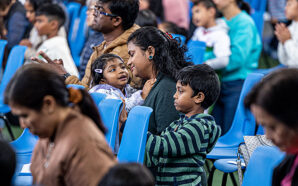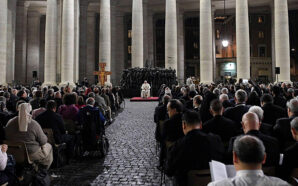A voice said, “Cry out.” and I said, “What shall I cry?” – Isaiah 40:1
Scripture abounds with pleas from God calling on us to cry out; to challenge injustice; to hear the voices of the poor, the powerless, and the weak.
As Christians, we cannot ignore these voices. Jesus was, and still is, constantly asking people to listen, to hear, to reach out, to live justly. And so, in Australia now, at this moment, we need to question ourselves honestly as to how well we listen, to the voices on the margins of our Church, and especially to our Indigenous brothers and sisters whose cry is: ‘Give us a Voice’. But also:
“What Aboriginal people ask is that the modern world now makes the sacrifices necessary to give us a real future…To let us breathe, to let us be free…. Let us be who we are – Aboriginal people in a modern world – and be proud of us. Acknowledge that we are here with our songs, our ceremonies, our land, our language and our people – our full identity. What a gift this is that we can give you, if you choose to accept us in a meaningful way.” – ‘Rom Watangu’: Galarrwuy Yunupingu, The Monthly, July 2016.
The Uluru Statement from the Heart calls for a First Nations Voice to Parliament.
In an upcoming national referendum, we will all be asked to listen and respond to this call. The Voice would ensure that the views of Aboriginal and Torres Strait Islander people are heard by lawmakers, and could help Parliament enact better and more effective laws. Will we give them a voice?
Pope Francis, marking the 50th anniversary of the Synod of Bishops, said to us:
“The world needs the Catholic Church to witness to that Christian vision of community, participation, solidarity and joint responsibility. In too many countries power is in the hands of just a few people, the dignity of many is denied and authority is abused.”
Perhaps we could ask ourselves whether we are up to this challenge. Are we capable of softening our hearts and opening our ears to hear the voice calling from Uluru? Are we afraid of the consequences for our Church, our country? Are we afraid of telling and hearing the truth? These are serious questions, and they require of us the courage to allow ourselves to be challenged. For:
“Australia has a dark history, and we need to recognise that and own it. We also need to recognise that the Aboriginal and Torres Strait Islander peoples of Australia have a unique and inherent connection to, and responsibility for, Country under their law and custom.” – Dr. Ed Wensing, Centre for Aboriginal Economic Policy Research at the Australian National University.
Pope Francis asks: “Are we good at listening? How good is the ‘hearing’ of our heart? Do we allow people to express themselves?”
“Listen to the world, to the challenges and changes that it sets before us. Let us not soundproof our hearts; let us not remain barricaded in our certainties. So often our certainties can make us closed. Let us listen to one another.” – 50th anniversary of the Synod of Bishops.
The Australian Catholic Bishops, on the recommendation of their key Aboriginal and Torres Strait Islander advisers, have endorsed the Uluru Statement from the Heart informed by the words of Pope St John Paul II, who in a visit to Alice Springs in 1986, said to Aboriginal and Torres Strait Islander peoples: “You must not be allowed to disappear… Your songs, your stories, your paintings, your dances, your languages, must never be lost.”
The Plenary Council in Australia has also made positive commitments for the Catholic Church to endorse the Uluru Statement from the Heart; to accept our responsibility for the part played by the Church in the harms Aboriginal and Torres Strait Islander people have suffered; and to commit to continuing to work toward recognition, Reconciliation and justice.
Can we individually commit to moving out from our comfort zones and embrace something new; to humbly accept that there are things we can learn from our Indigenous brothers and sisters?
Collectively we must consider how to come to terms with unresolved and legitimate grievances of Aboriginal and Torres Strait Islander peoples arising from colonisation and its ongoing consequences.
“‘Console my people, console them’ says your God. ‘Prepare in the wilderness a way for Yahweh. Make a straight highway for our God across the desert.” – Isaiah 40:3-4
Find out about The Aboriginal and Torres Strait Islander Voice at the Australian Government website voice.niaa.gov.au
Sr Antonia Curtis OSB is a Benedictine Sister at Jamberoo Abbey, NSW. She recently conducted an online retreat on Aboriginal Spirituality with Theresa Ardler of the Dahrawal Nation. You can access the course, Sacred Connections at www.jamberooabbey.org.au
This article was originally published in the 2023 Lent and Easter | Autumn edition of the Catholic Outlook Magazine. You can pick up your copy of the magazine in parishes and offices across the Diocese of Parramatta now or you can read the digital version here.








